Impact of Economic Fluctuations on JLA Construction Company
VerifiedAdded on 2021/02/20
|11
|2716
|166
Report
AI Summary
This report investigates the impact of economic fluctuations on the profitability of JLA Construction Company. It begins with an overview of economic fluctuations, their stages (prosperity, recession, depression, recovery), and their impact on businesses. The background of JLA Construction Company, its operations, and significance are discussed, including research aims, objectives, and research questions. The research methodology chapter details the research philosophy (interpretivism), approach (inductive), design (experimental), and data collection methods (quantitative, using questionnaires and secondary sources). Data analysis involves thematic analysis to interpret questionnaire responses. The report also addresses research ethics, limitations, reliability, validity, and the research budget. The report explores data presentation techniques and data analysis techniques used in the study. Finally, the report concludes with an analysis of data and discussion of the ethical considerations and limitations of the research.
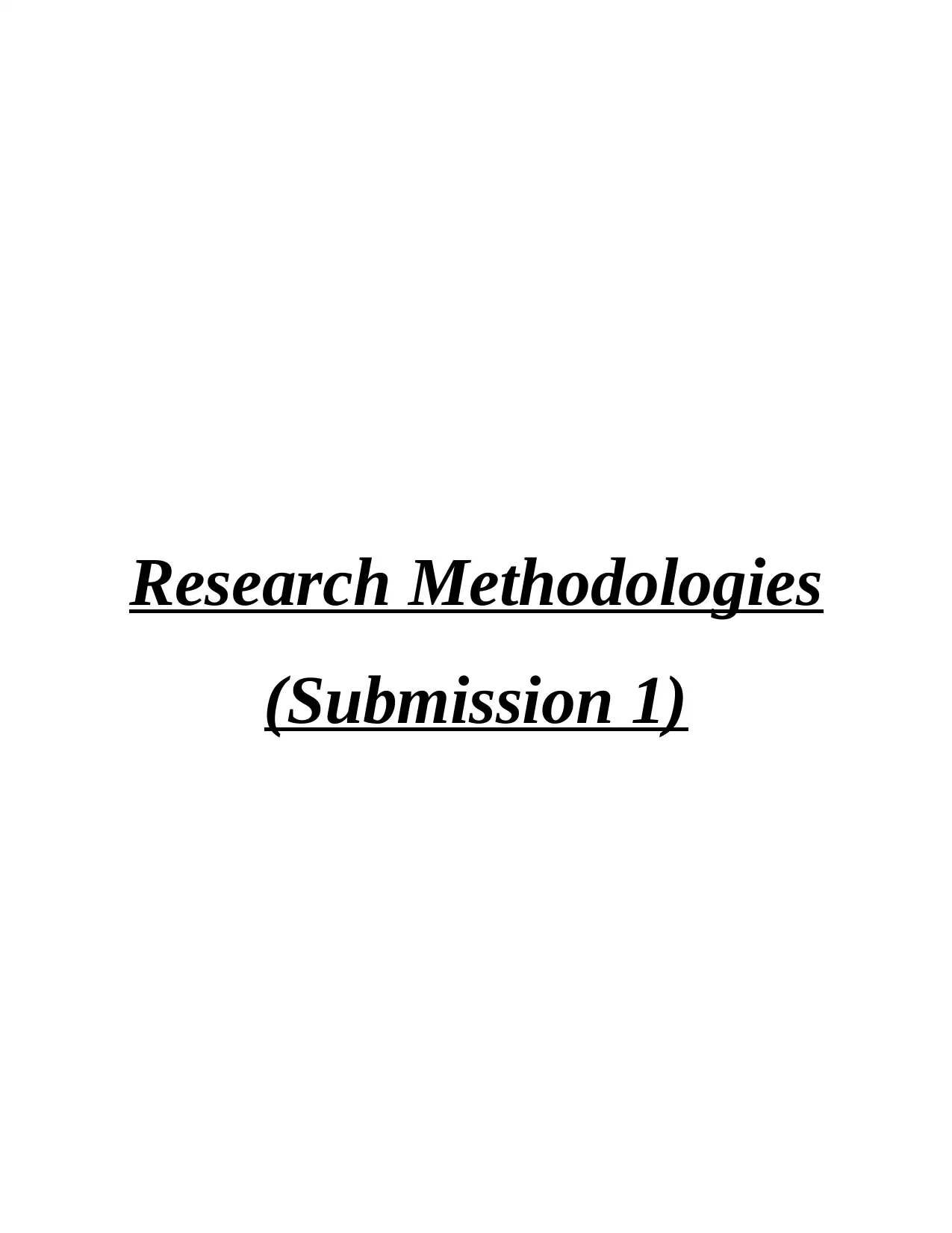
Research Methodologies
(Submission 1)
(Submission 1)
Paraphrase This Document
Need a fresh take? Get an instant paraphrase of this document with our AI Paraphraser
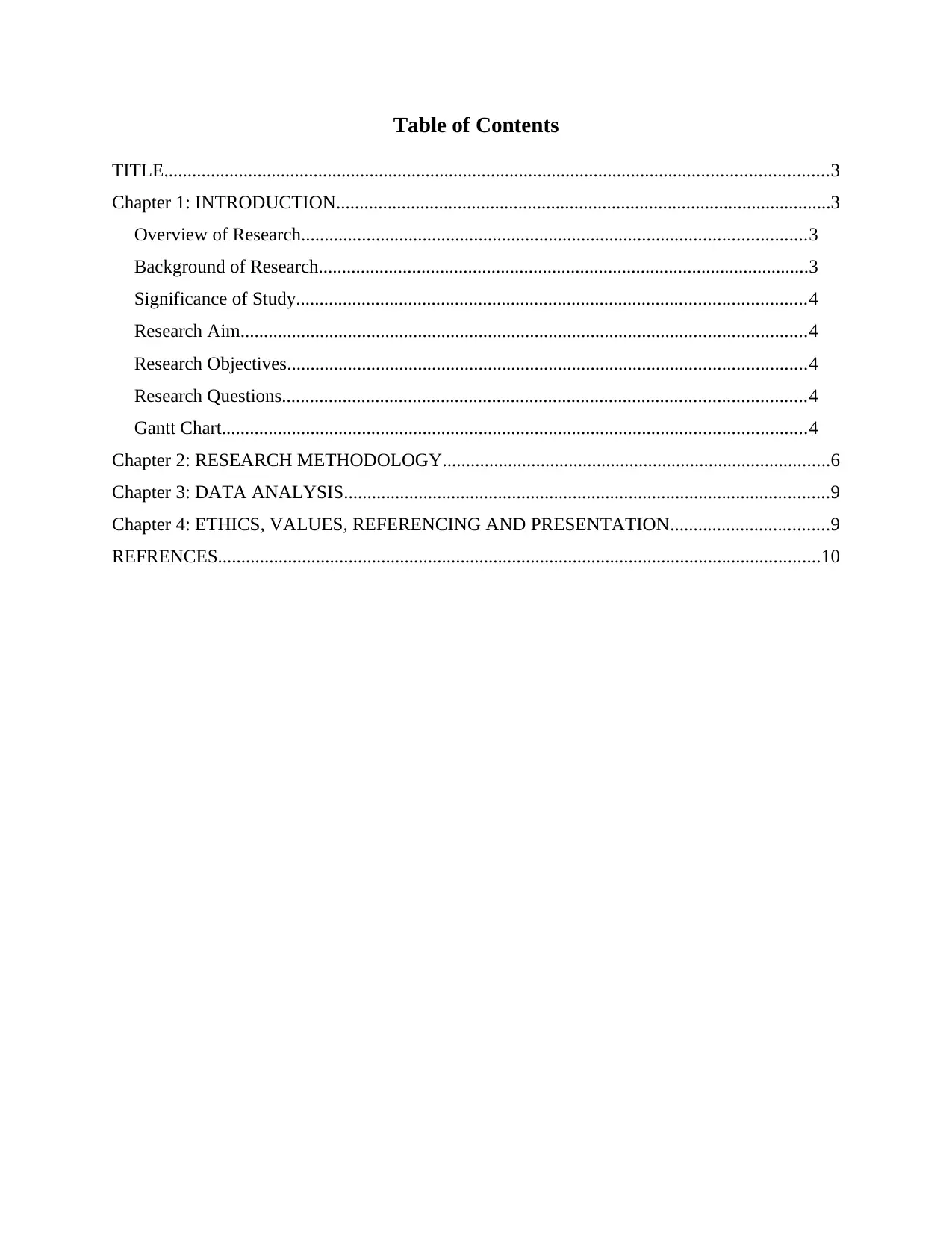
Table of Contents
TITLE..............................................................................................................................................3
Chapter 1: INTRODUCTION..........................................................................................................3
Overview of Research............................................................................................................3
Background of Research.........................................................................................................3
Significance of Study.............................................................................................................4
Research Aim.........................................................................................................................4
Research Objectives...............................................................................................................4
Research Questions................................................................................................................4
Gantt Chart.............................................................................................................................4
Chapter 2: RESEARCH METHODOLOGY...................................................................................6
Chapter 3: DATA ANALYSIS........................................................................................................9
Chapter 4: ETHICS, VALUES, REFERENCING AND PRESENTATION..................................9
REFRENCES.................................................................................................................................10
TITLE..............................................................................................................................................3
Chapter 1: INTRODUCTION..........................................................................................................3
Overview of Research............................................................................................................3
Background of Research.........................................................................................................3
Significance of Study.............................................................................................................4
Research Aim.........................................................................................................................4
Research Objectives...............................................................................................................4
Research Questions................................................................................................................4
Gantt Chart.............................................................................................................................4
Chapter 2: RESEARCH METHODOLOGY...................................................................................6
Chapter 3: DATA ANALYSIS........................................................................................................9
Chapter 4: ETHICS, VALUES, REFERENCING AND PRESENTATION..................................9
REFRENCES.................................................................................................................................10

⊘ This is a preview!⊘
Do you want full access?
Subscribe today to unlock all pages.

Trusted by 1+ million students worldwide
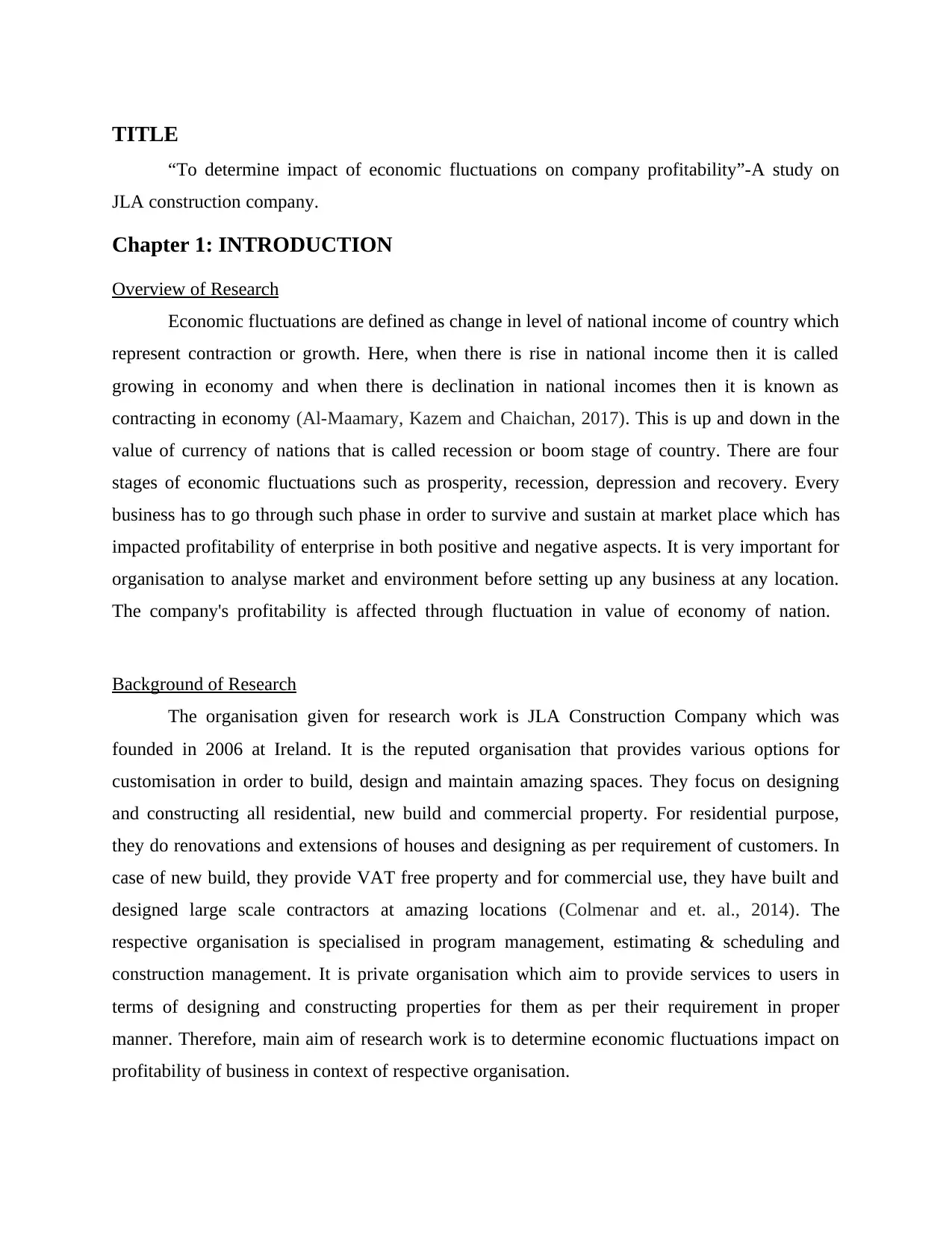
TITLE
“To determine impact of economic fluctuations on company profitability”-A study on
JLA construction company.
Chapter 1: INTRODUCTION
Overview of Research
Economic fluctuations are defined as change in level of national income of country which
represent contraction or growth. Here, when there is rise in national income then it is called
growing in economy and when there is declination in national incomes then it is known as
contracting in economy (Al-Maamary, Kazem and Chaichan, 2017). This is up and down in the
value of currency of nations that is called recession or boom stage of country. There are four
stages of economic fluctuations such as prosperity, recession, depression and recovery. Every
business has to go through such phase in order to survive and sustain at market place which has
impacted profitability of enterprise in both positive and negative aspects. It is very important for
organisation to analyse market and environment before setting up any business at any location.
The company's profitability is affected through fluctuation in value of economy of nation.
Background of Research
The organisation given for research work is JLA Construction Company which was
founded in 2006 at Ireland. It is the reputed organisation that provides various options for
customisation in order to build, design and maintain amazing spaces. They focus on designing
and constructing all residential, new build and commercial property. For residential purpose,
they do renovations and extensions of houses and designing as per requirement of customers. In
case of new build, they provide VAT free property and for commercial use, they have built and
designed large scale contractors at amazing locations (Colmenar and et. al., 2014). The
respective organisation is specialised in program management, estimating & scheduling and
construction management. It is private organisation which aim to provide services to users in
terms of designing and constructing properties for them as per their requirement in proper
manner. Therefore, main aim of research work is to determine economic fluctuations impact on
profitability of business in context of respective organisation.
“To determine impact of economic fluctuations on company profitability”-A study on
JLA construction company.
Chapter 1: INTRODUCTION
Overview of Research
Economic fluctuations are defined as change in level of national income of country which
represent contraction or growth. Here, when there is rise in national income then it is called
growing in economy and when there is declination in national incomes then it is known as
contracting in economy (Al-Maamary, Kazem and Chaichan, 2017). This is up and down in the
value of currency of nations that is called recession or boom stage of country. There are four
stages of economic fluctuations such as prosperity, recession, depression and recovery. Every
business has to go through such phase in order to survive and sustain at market place which has
impacted profitability of enterprise in both positive and negative aspects. It is very important for
organisation to analyse market and environment before setting up any business at any location.
The company's profitability is affected through fluctuation in value of economy of nation.
Background of Research
The organisation given for research work is JLA Construction Company which was
founded in 2006 at Ireland. It is the reputed organisation that provides various options for
customisation in order to build, design and maintain amazing spaces. They focus on designing
and constructing all residential, new build and commercial property. For residential purpose,
they do renovations and extensions of houses and designing as per requirement of customers. In
case of new build, they provide VAT free property and for commercial use, they have built and
designed large scale contractors at amazing locations (Colmenar and et. al., 2014). The
respective organisation is specialised in program management, estimating & scheduling and
construction management. It is private organisation which aim to provide services to users in
terms of designing and constructing properties for them as per their requirement in proper
manner. Therefore, main aim of research work is to determine economic fluctuations impact on
profitability of business in context of respective organisation.
Paraphrase This Document
Need a fresh take? Get an instant paraphrase of this document with our AI Paraphraser
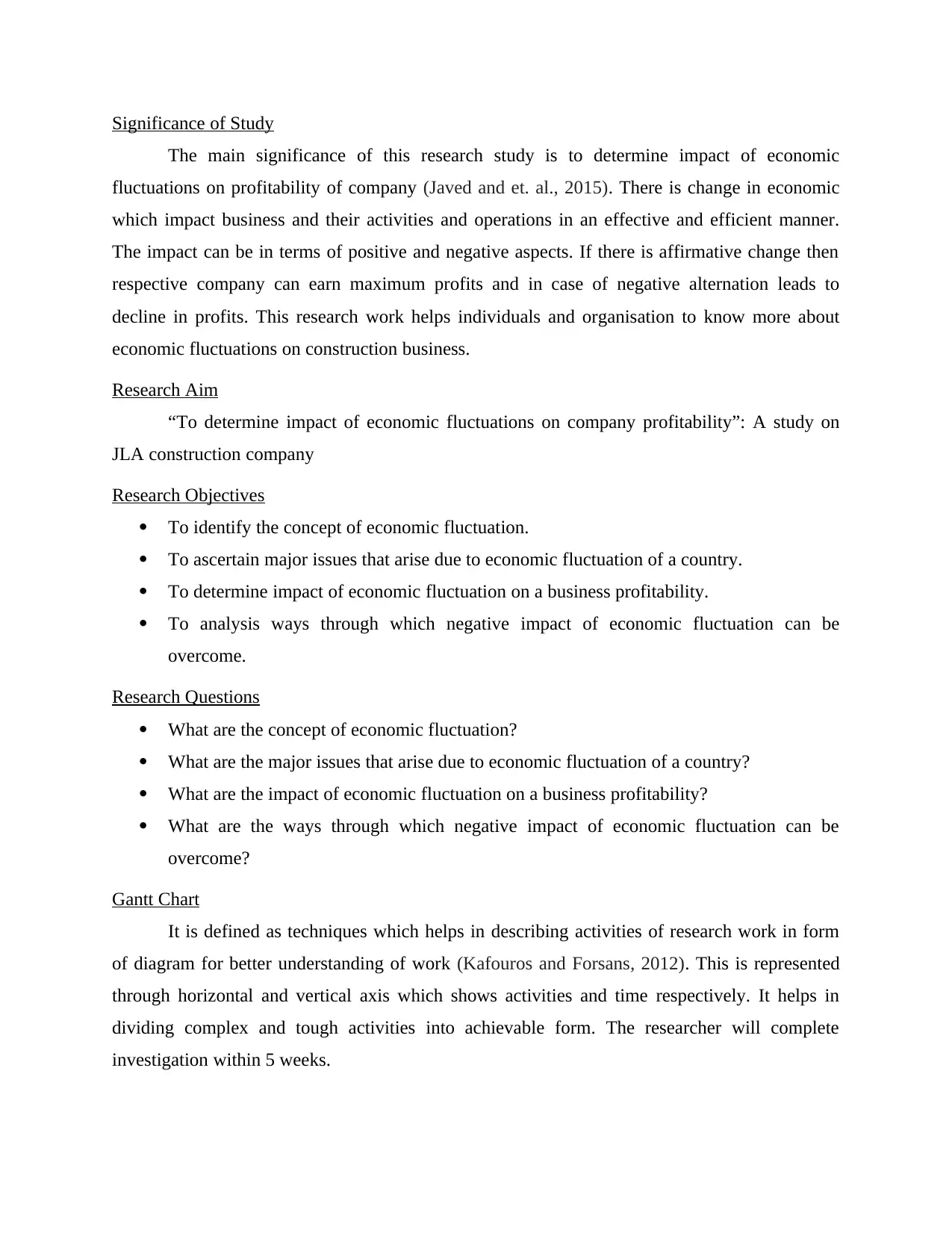
Significance of Study
The main significance of this research study is to determine impact of economic
fluctuations on profitability of company (Javed and et. al., 2015). There is change in economic
which impact business and their activities and operations in an effective and efficient manner.
The impact can be in terms of positive and negative aspects. If there is affirmative change then
respective company can earn maximum profits and in case of negative alternation leads to
decline in profits. This research work helps individuals and organisation to know more about
economic fluctuations on construction business.
Research Aim
“To determine impact of economic fluctuations on company profitability”: A study on
JLA construction company
Research Objectives
To identify the concept of economic fluctuation.
To ascertain major issues that arise due to economic fluctuation of a country.
To determine impact of economic fluctuation on a business profitability.
To analysis ways through which negative impact of economic fluctuation can be
overcome.
Research Questions
What are the concept of economic fluctuation?
What are the major issues that arise due to economic fluctuation of a country?
What are the impact of economic fluctuation on a business profitability?
What are the ways through which negative impact of economic fluctuation can be
overcome?
Gantt Chart
It is defined as techniques which helps in describing activities of research work in form
of diagram for better understanding of work (Kafouros and Forsans, 2012). This is represented
through horizontal and vertical axis which shows activities and time respectively. It helps in
dividing complex and tough activities into achievable form. The researcher will complete
investigation within 5 weeks.
The main significance of this research study is to determine impact of economic
fluctuations on profitability of company (Javed and et. al., 2015). There is change in economic
which impact business and their activities and operations in an effective and efficient manner.
The impact can be in terms of positive and negative aspects. If there is affirmative change then
respective company can earn maximum profits and in case of negative alternation leads to
decline in profits. This research work helps individuals and organisation to know more about
economic fluctuations on construction business.
Research Aim
“To determine impact of economic fluctuations on company profitability”: A study on
JLA construction company
Research Objectives
To identify the concept of economic fluctuation.
To ascertain major issues that arise due to economic fluctuation of a country.
To determine impact of economic fluctuation on a business profitability.
To analysis ways through which negative impact of economic fluctuation can be
overcome.
Research Questions
What are the concept of economic fluctuation?
What are the major issues that arise due to economic fluctuation of a country?
What are the impact of economic fluctuation on a business profitability?
What are the ways through which negative impact of economic fluctuation can be
overcome?
Gantt Chart
It is defined as techniques which helps in describing activities of research work in form
of diagram for better understanding of work (Kafouros and Forsans, 2012). This is represented
through horizontal and vertical axis which shows activities and time respectively. It helps in
dividing complex and tough activities into achievable form. The researcher will complete
investigation within 5 weeks.
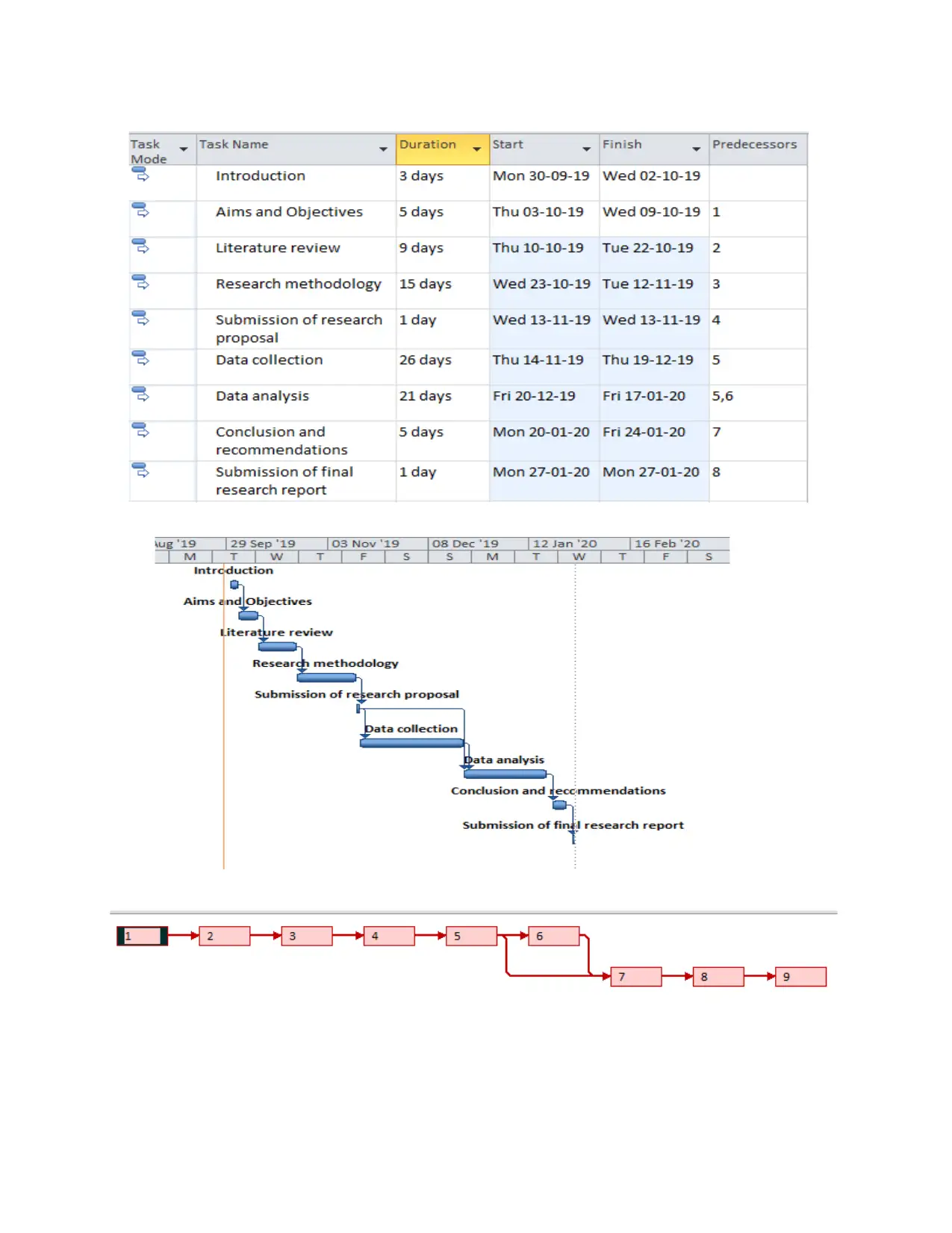
⊘ This is a preview!⊘
Do you want full access?
Subscribe today to unlock all pages.

Trusted by 1+ million students worldwide
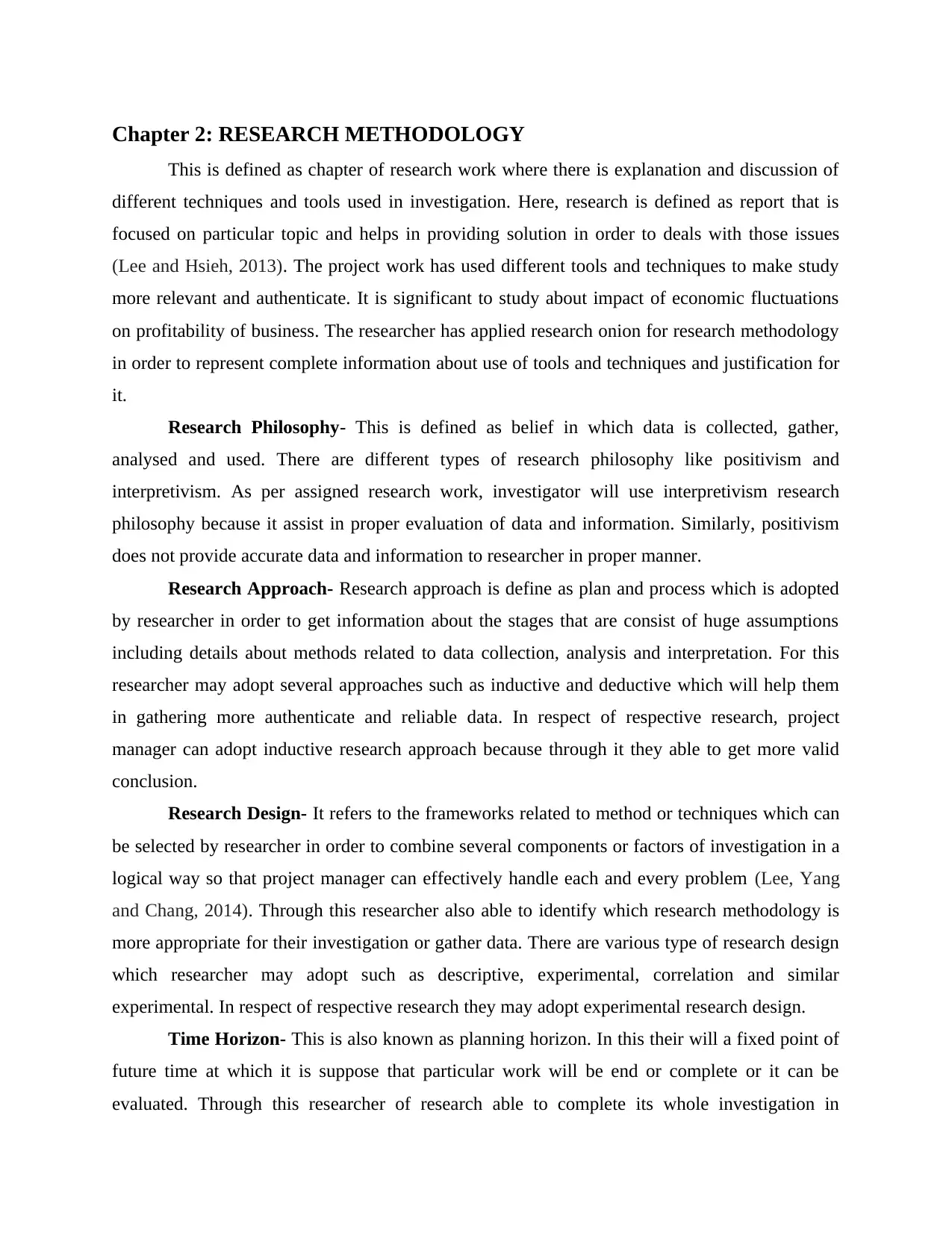
Chapter 2: RESEARCH METHODOLOGY
This is defined as chapter of research work where there is explanation and discussion of
different techniques and tools used in investigation. Here, research is defined as report that is
focused on particular topic and helps in providing solution in order to deals with those issues
(Lee and Hsieh, 2013). The project work has used different tools and techniques to make study
more relevant and authenticate. It is significant to study about impact of economic fluctuations
on profitability of business. The researcher has applied research onion for research methodology
in order to represent complete information about use of tools and techniques and justification for
it.
Research Philosophy- This is defined as belief in which data is collected, gather,
analysed and used. There are different types of research philosophy like positivism and
interpretivism. As per assigned research work, investigator will use interpretivism research
philosophy because it assist in proper evaluation of data and information. Similarly, positivism
does not provide accurate data and information to researcher in proper manner.
Research Approach- Research approach is define as plan and process which is adopted
by researcher in order to get information about the stages that are consist of huge assumptions
including details about methods related to data collection, analysis and interpretation. For this
researcher may adopt several approaches such as inductive and deductive which will help them
in gathering more authenticate and reliable data. In respect of respective research, project
manager can adopt inductive research approach because through it they able to get more valid
conclusion.
Research Design- It refers to the frameworks related to method or techniques which can
be selected by researcher in order to combine several components or factors of investigation in a
logical way so that project manager can effectively handle each and every problem (Lee, Yang
and Chang, 2014). Through this researcher also able to identify which research methodology is
more appropriate for their investigation or gather data. There are various type of research design
which researcher may adopt such as descriptive, experimental, correlation and similar
experimental. In respect of respective research they may adopt experimental research design.
Time Horizon- This is also known as planning horizon. In this their will a fixed point of
future time at which it is suppose that particular work will be end or complete or it can be
evaluated. Through this researcher of research able to complete its whole investigation in
This is defined as chapter of research work where there is explanation and discussion of
different techniques and tools used in investigation. Here, research is defined as report that is
focused on particular topic and helps in providing solution in order to deals with those issues
(Lee and Hsieh, 2013). The project work has used different tools and techniques to make study
more relevant and authenticate. It is significant to study about impact of economic fluctuations
on profitability of business. The researcher has applied research onion for research methodology
in order to represent complete information about use of tools and techniques and justification for
it.
Research Philosophy- This is defined as belief in which data is collected, gather,
analysed and used. There are different types of research philosophy like positivism and
interpretivism. As per assigned research work, investigator will use interpretivism research
philosophy because it assist in proper evaluation of data and information. Similarly, positivism
does not provide accurate data and information to researcher in proper manner.
Research Approach- Research approach is define as plan and process which is adopted
by researcher in order to get information about the stages that are consist of huge assumptions
including details about methods related to data collection, analysis and interpretation. For this
researcher may adopt several approaches such as inductive and deductive which will help them
in gathering more authenticate and reliable data. In respect of respective research, project
manager can adopt inductive research approach because through it they able to get more valid
conclusion.
Research Design- It refers to the frameworks related to method or techniques which can
be selected by researcher in order to combine several components or factors of investigation in a
logical way so that project manager can effectively handle each and every problem (Lee, Yang
and Chang, 2014). Through this researcher also able to identify which research methodology is
more appropriate for their investigation or gather data. There are various type of research design
which researcher may adopt such as descriptive, experimental, correlation and similar
experimental. In respect of respective research they may adopt experimental research design.
Time Horizon- This is also known as planning horizon. In this their will a fixed point of
future time at which it is suppose that particular work will be end or complete or it can be
evaluated. Through this researcher of research able to complete its whole investigation in
Paraphrase This Document
Need a fresh take? Get an instant paraphrase of this document with our AI Paraphraser
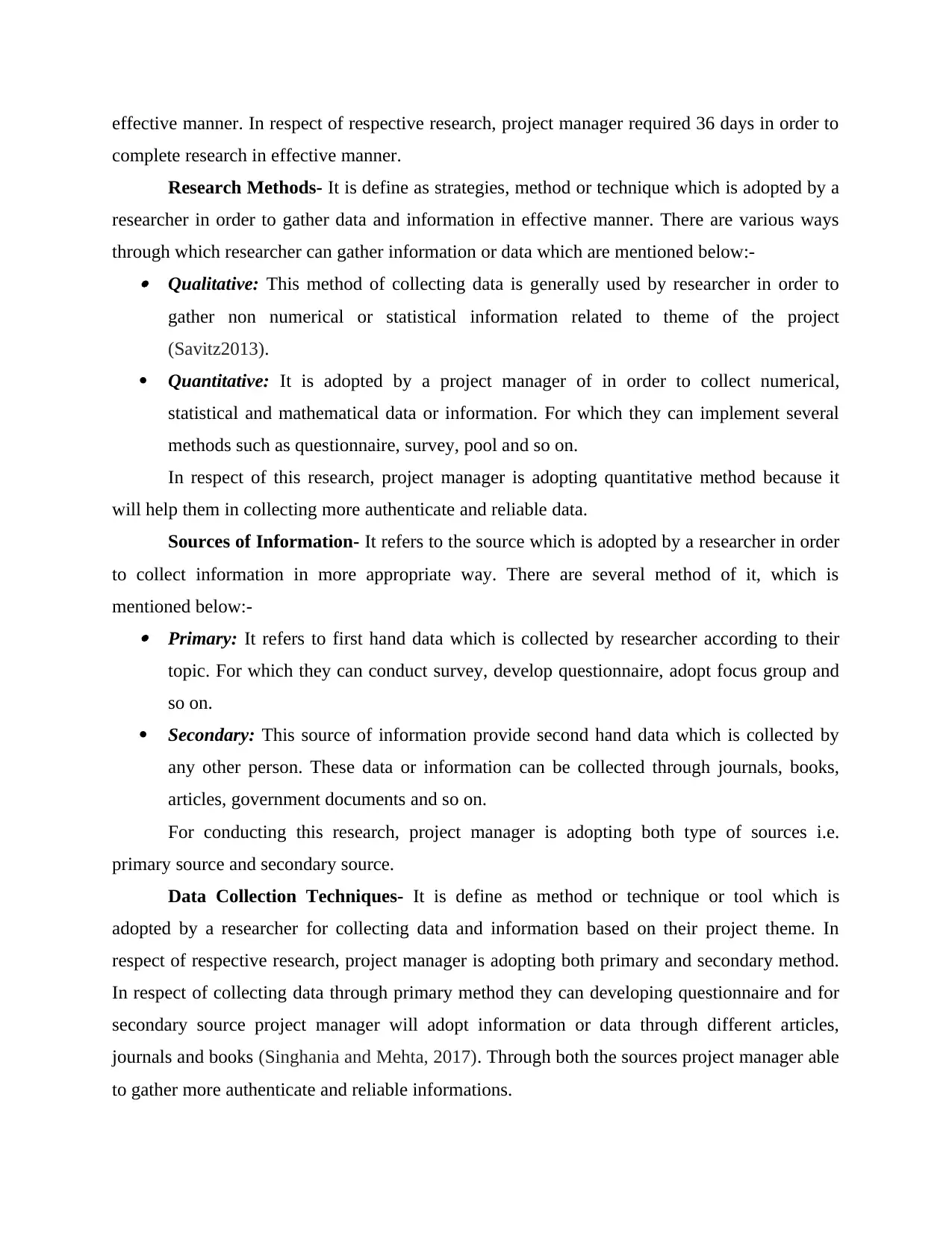
effective manner. In respect of respective research, project manager required 36 days in order to
complete research in effective manner.
Research Methods- It is define as strategies, method or technique which is adopted by a
researcher in order to gather data and information in effective manner. There are various ways
through which researcher can gather information or data which are mentioned below:- Qualitative: This method of collecting data is generally used by researcher in order to
gather non numerical or statistical information related to theme of the project
(Savitz2013).
Quantitative: It is adopted by a project manager of in order to collect numerical,
statistical and mathematical data or information. For which they can implement several
methods such as questionnaire, survey, pool and so on.
In respect of this research, project manager is adopting quantitative method because it
will help them in collecting more authenticate and reliable data.
Sources of Information- It refers to the source which is adopted by a researcher in order
to collect information in more appropriate way. There are several method of it, which is
mentioned below:- Primary: It refers to first hand data which is collected by researcher according to their
topic. For which they can conduct survey, develop questionnaire, adopt focus group and
so on.
Secondary: This source of information provide second hand data which is collected by
any other person. These data or information can be collected through journals, books,
articles, government documents and so on.
For conducting this research, project manager is adopting both type of sources i.e.
primary source and secondary source.
Data Collection Techniques- It is define as method or technique or tool which is
adopted by a researcher for collecting data and information based on their project theme. In
respect of respective research, project manager is adopting both primary and secondary method.
In respect of collecting data through primary method they can developing questionnaire and for
secondary source project manager will adopt information or data through different articles,
journals and books (Singhania and Mehta, 2017). Through both the sources project manager able
to gather more authenticate and reliable informations.
complete research in effective manner.
Research Methods- It is define as strategies, method or technique which is adopted by a
researcher in order to gather data and information in effective manner. There are various ways
through which researcher can gather information or data which are mentioned below:- Qualitative: This method of collecting data is generally used by researcher in order to
gather non numerical or statistical information related to theme of the project
(Savitz2013).
Quantitative: It is adopted by a project manager of in order to collect numerical,
statistical and mathematical data or information. For which they can implement several
methods such as questionnaire, survey, pool and so on.
In respect of this research, project manager is adopting quantitative method because it
will help them in collecting more authenticate and reliable data.
Sources of Information- It refers to the source which is adopted by a researcher in order
to collect information in more appropriate way. There are several method of it, which is
mentioned below:- Primary: It refers to first hand data which is collected by researcher according to their
topic. For which they can conduct survey, develop questionnaire, adopt focus group and
so on.
Secondary: This source of information provide second hand data which is collected by
any other person. These data or information can be collected through journals, books,
articles, government documents and so on.
For conducting this research, project manager is adopting both type of sources i.e.
primary source and secondary source.
Data Collection Techniques- It is define as method or technique or tool which is
adopted by a researcher for collecting data and information based on their project theme. In
respect of respective research, project manager is adopting both primary and secondary method.
In respect of collecting data through primary method they can developing questionnaire and for
secondary source project manager will adopt information or data through different articles,
journals and books (Singhania and Mehta, 2017). Through both the sources project manager able
to gather more authenticate and reliable informations.
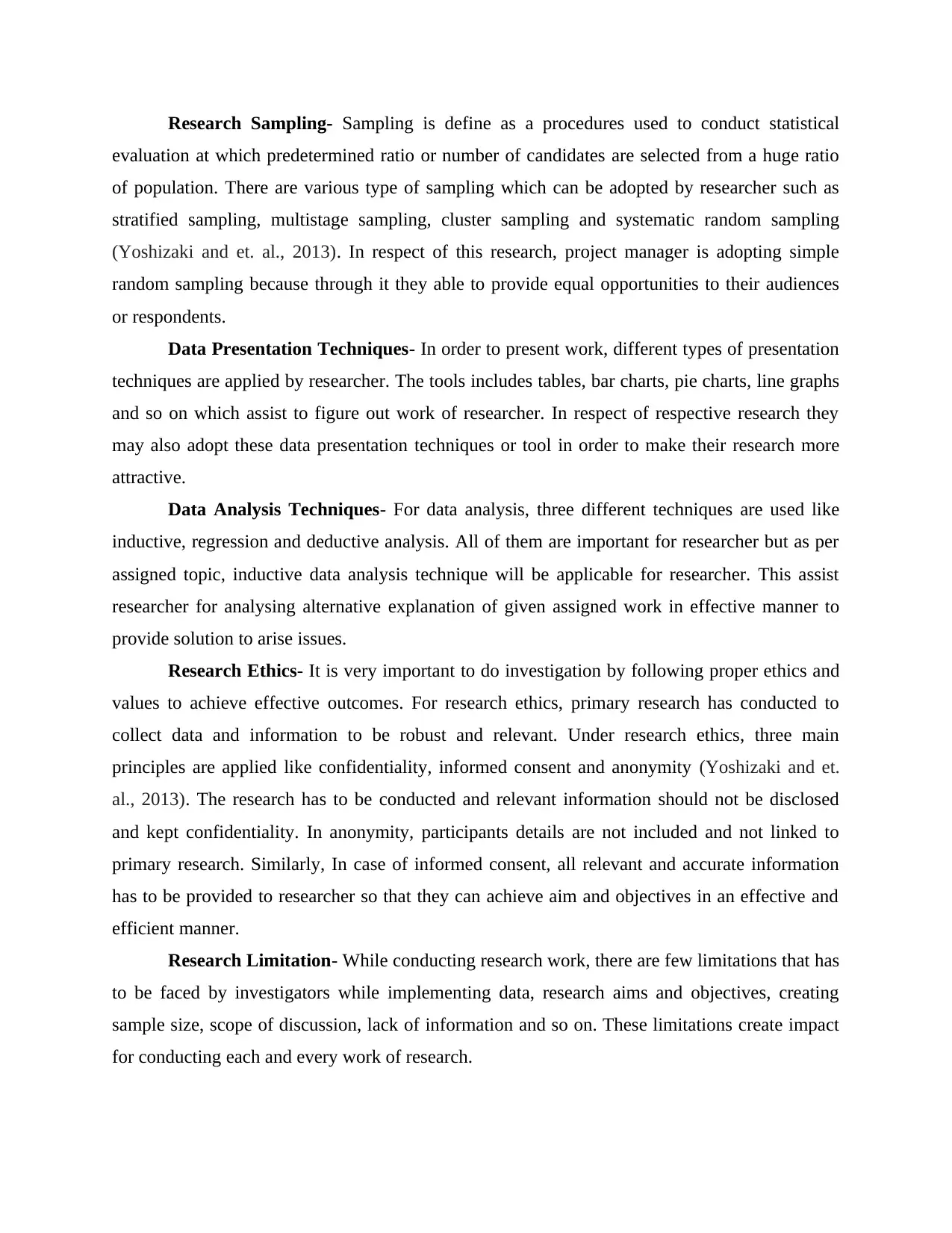
Research Sampling- Sampling is define as a procedures used to conduct statistical
evaluation at which predetermined ratio or number of candidates are selected from a huge ratio
of population. There are various type of sampling which can be adopted by researcher such as
stratified sampling, multistage sampling, cluster sampling and systematic random sampling
(Yoshizaki and et. al., 2013). In respect of this research, project manager is adopting simple
random sampling because through it they able to provide equal opportunities to their audiences
or respondents.
Data Presentation Techniques- In order to present work, different types of presentation
techniques are applied by researcher. The tools includes tables, bar charts, pie charts, line graphs
and so on which assist to figure out work of researcher. In respect of respective research they
may also adopt these data presentation techniques or tool in order to make their research more
attractive.
Data Analysis Techniques- For data analysis, three different techniques are used like
inductive, regression and deductive analysis. All of them are important for researcher but as per
assigned topic, inductive data analysis technique will be applicable for researcher. This assist
researcher for analysing alternative explanation of given assigned work in effective manner to
provide solution to arise issues.
Research Ethics- It is very important to do investigation by following proper ethics and
values to achieve effective outcomes. For research ethics, primary research has conducted to
collect data and information to be robust and relevant. Under research ethics, three main
principles are applied like confidentiality, informed consent and anonymity (Yoshizaki and et.
al., 2013). The research has to be conducted and relevant information should not be disclosed
and kept confidentiality. In anonymity, participants details are not included and not linked to
primary research. Similarly, In case of informed consent, all relevant and accurate information
has to be provided to researcher so that they can achieve aim and objectives in an effective and
efficient manner.
Research Limitation- While conducting research work, there are few limitations that has
to be faced by investigators while implementing data, research aims and objectives, creating
sample size, scope of discussion, lack of information and so on. These limitations create impact
for conducting each and every work of research.
evaluation at which predetermined ratio or number of candidates are selected from a huge ratio
of population. There are various type of sampling which can be adopted by researcher such as
stratified sampling, multistage sampling, cluster sampling and systematic random sampling
(Yoshizaki and et. al., 2013). In respect of this research, project manager is adopting simple
random sampling because through it they able to provide equal opportunities to their audiences
or respondents.
Data Presentation Techniques- In order to present work, different types of presentation
techniques are applied by researcher. The tools includes tables, bar charts, pie charts, line graphs
and so on which assist to figure out work of researcher. In respect of respective research they
may also adopt these data presentation techniques or tool in order to make their research more
attractive.
Data Analysis Techniques- For data analysis, three different techniques are used like
inductive, regression and deductive analysis. All of them are important for researcher but as per
assigned topic, inductive data analysis technique will be applicable for researcher. This assist
researcher for analysing alternative explanation of given assigned work in effective manner to
provide solution to arise issues.
Research Ethics- It is very important to do investigation by following proper ethics and
values to achieve effective outcomes. For research ethics, primary research has conducted to
collect data and information to be robust and relevant. Under research ethics, three main
principles are applied like confidentiality, informed consent and anonymity (Yoshizaki and et.
al., 2013). The research has to be conducted and relevant information should not be disclosed
and kept confidentiality. In anonymity, participants details are not included and not linked to
primary research. Similarly, In case of informed consent, all relevant and accurate information
has to be provided to researcher so that they can achieve aim and objectives in an effective and
efficient manner.
Research Limitation- While conducting research work, there are few limitations that has
to be faced by investigators while implementing data, research aims and objectives, creating
sample size, scope of discussion, lack of information and so on. These limitations create impact
for conducting each and every work of research.
⊘ This is a preview!⊘
Do you want full access?
Subscribe today to unlock all pages.

Trusted by 1+ million students worldwide
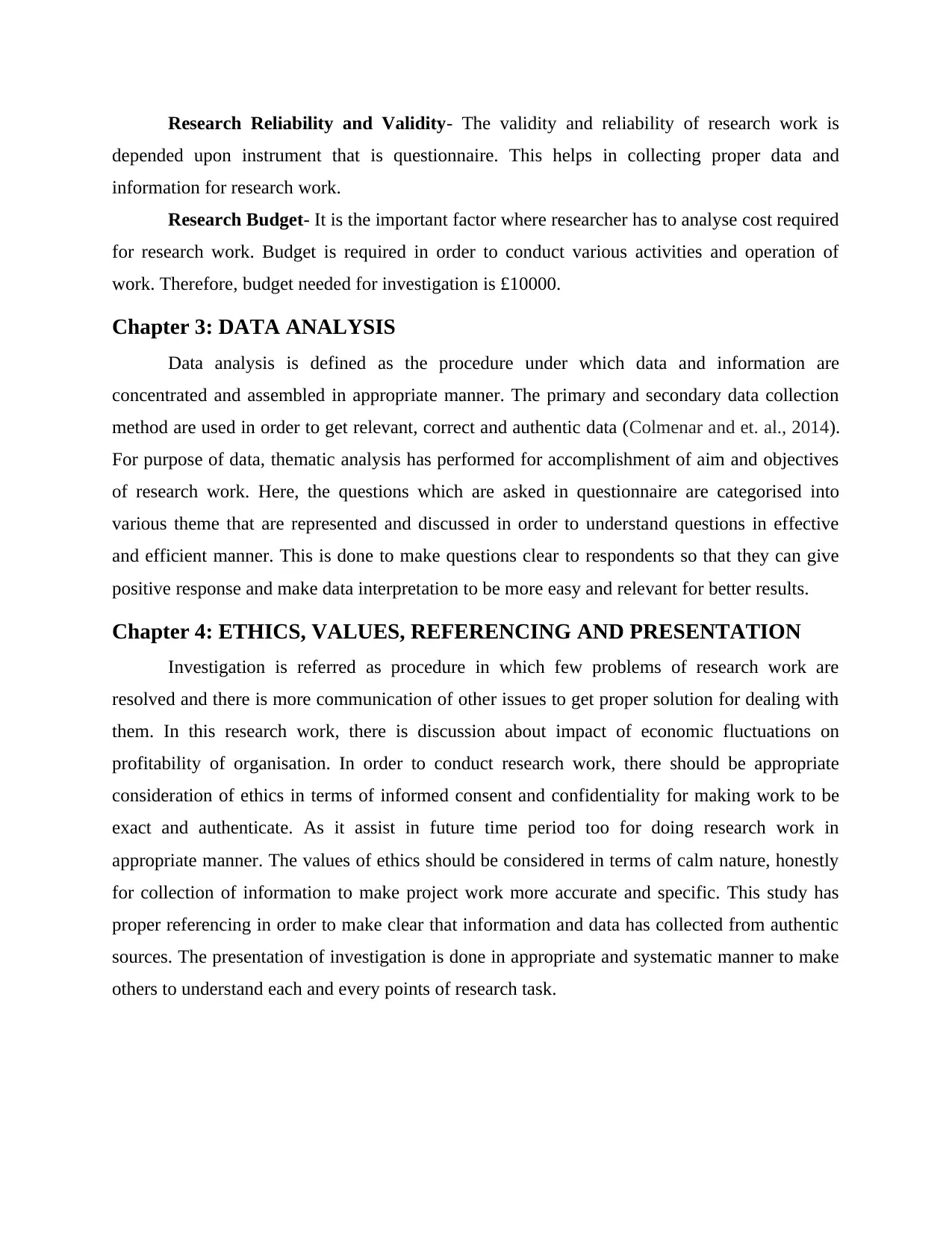
Research Reliability and Validity- The validity and reliability of research work is
depended upon instrument that is questionnaire. This helps in collecting proper data and
information for research work.
Research Budget- It is the important factor where researcher has to analyse cost required
for research work. Budget is required in order to conduct various activities and operation of
work. Therefore, budget needed for investigation is £10000.
Chapter 3: DATA ANALYSIS
Data analysis is defined as the procedure under which data and information are
concentrated and assembled in appropriate manner. The primary and secondary data collection
method are used in order to get relevant, correct and authentic data (Colmenar and et. al., 2014).
For purpose of data, thematic analysis has performed for accomplishment of aim and objectives
of research work. Here, the questions which are asked in questionnaire are categorised into
various theme that are represented and discussed in order to understand questions in effective
and efficient manner. This is done to make questions clear to respondents so that they can give
positive response and make data interpretation to be more easy and relevant for better results.
Chapter 4: ETHICS, VALUES, REFERENCING AND PRESENTATION
Investigation is referred as procedure in which few problems of research work are
resolved and there is more communication of other issues to get proper solution for dealing with
them. In this research work, there is discussion about impact of economic fluctuations on
profitability of organisation. In order to conduct research work, there should be appropriate
consideration of ethics in terms of informed consent and confidentiality for making work to be
exact and authenticate. As it assist in future time period too for doing research work in
appropriate manner. The values of ethics should be considered in terms of calm nature, honestly
for collection of information to make project work more accurate and specific. This study has
proper referencing in order to make clear that information and data has collected from authentic
sources. The presentation of investigation is done in appropriate and systematic manner to make
others to understand each and every points of research task.
depended upon instrument that is questionnaire. This helps in collecting proper data and
information for research work.
Research Budget- It is the important factor where researcher has to analyse cost required
for research work. Budget is required in order to conduct various activities and operation of
work. Therefore, budget needed for investigation is £10000.
Chapter 3: DATA ANALYSIS
Data analysis is defined as the procedure under which data and information are
concentrated and assembled in appropriate manner. The primary and secondary data collection
method are used in order to get relevant, correct and authentic data (Colmenar and et. al., 2014).
For purpose of data, thematic analysis has performed for accomplishment of aim and objectives
of research work. Here, the questions which are asked in questionnaire are categorised into
various theme that are represented and discussed in order to understand questions in effective
and efficient manner. This is done to make questions clear to respondents so that they can give
positive response and make data interpretation to be more easy and relevant for better results.
Chapter 4: ETHICS, VALUES, REFERENCING AND PRESENTATION
Investigation is referred as procedure in which few problems of research work are
resolved and there is more communication of other issues to get proper solution for dealing with
them. In this research work, there is discussion about impact of economic fluctuations on
profitability of organisation. In order to conduct research work, there should be appropriate
consideration of ethics in terms of informed consent and confidentiality for making work to be
exact and authenticate. As it assist in future time period too for doing research work in
appropriate manner. The values of ethics should be considered in terms of calm nature, honestly
for collection of information to make project work more accurate and specific. This study has
proper referencing in order to make clear that information and data has collected from authentic
sources. The presentation of investigation is done in appropriate and systematic manner to make
others to understand each and every points of research task.
Paraphrase This Document
Need a fresh take? Get an instant paraphrase of this document with our AI Paraphraser
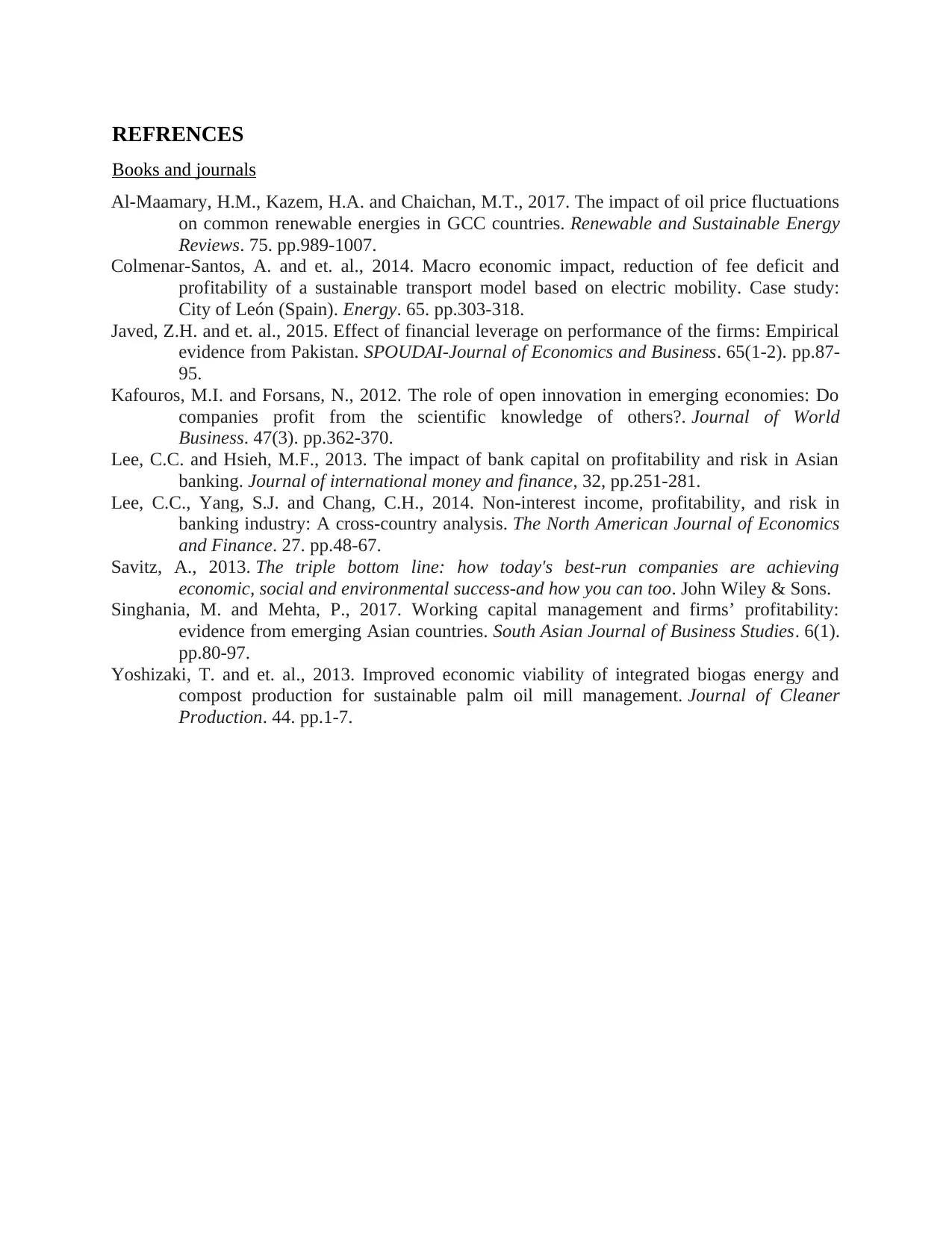
REFRENCES
Books and journals
Al-Maamary, H.M., Kazem, H.A. and Chaichan, M.T., 2017. The impact of oil price fluctuations
on common renewable energies in GCC countries. Renewable and Sustainable Energy
Reviews. 75. pp.989-1007.
Colmenar-Santos, A. and et. al., 2014. Macro economic impact, reduction of fee deficit and
profitability of a sustainable transport model based on electric mobility. Case study:
City of León (Spain). Energy. 65. pp.303-318.
Javed, Z.H. and et. al., 2015. Effect of financial leverage on performance of the firms: Empirical
evidence from Pakistan. SPOUDAI-Journal of Economics and Business. 65(1-2). pp.87-
95.
Kafouros, M.I. and Forsans, N., 2012. The role of open innovation in emerging economies: Do
companies profit from the scientific knowledge of others?. Journal of World
Business. 47(3). pp.362-370.
Lee, C.C. and Hsieh, M.F., 2013. The impact of bank capital on profitability and risk in Asian
banking. Journal of international money and finance, 32, pp.251-281.
Lee, C.C., Yang, S.J. and Chang, C.H., 2014. Non-interest income, profitability, and risk in
banking industry: A cross-country analysis. The North American Journal of Economics
and Finance. 27. pp.48-67.
Savitz, A., 2013. The triple bottom line: how today's best-run companies are achieving
economic, social and environmental success-and how you can too. John Wiley & Sons.
Singhania, M. and Mehta, P., 2017. Working capital management and firms’ profitability:
evidence from emerging Asian countries. South Asian Journal of Business Studies. 6(1).
pp.80-97.
Yoshizaki, T. and et. al., 2013. Improved economic viability of integrated biogas energy and
compost production for sustainable palm oil mill management. Journal of Cleaner
Production. 44. pp.1-7.
Books and journals
Al-Maamary, H.M., Kazem, H.A. and Chaichan, M.T., 2017. The impact of oil price fluctuations
on common renewable energies in GCC countries. Renewable and Sustainable Energy
Reviews. 75. pp.989-1007.
Colmenar-Santos, A. and et. al., 2014. Macro economic impact, reduction of fee deficit and
profitability of a sustainable transport model based on electric mobility. Case study:
City of León (Spain). Energy. 65. pp.303-318.
Javed, Z.H. and et. al., 2015. Effect of financial leverage on performance of the firms: Empirical
evidence from Pakistan. SPOUDAI-Journal of Economics and Business. 65(1-2). pp.87-
95.
Kafouros, M.I. and Forsans, N., 2012. The role of open innovation in emerging economies: Do
companies profit from the scientific knowledge of others?. Journal of World
Business. 47(3). pp.362-370.
Lee, C.C. and Hsieh, M.F., 2013. The impact of bank capital on profitability and risk in Asian
banking. Journal of international money and finance, 32, pp.251-281.
Lee, C.C., Yang, S.J. and Chang, C.H., 2014. Non-interest income, profitability, and risk in
banking industry: A cross-country analysis. The North American Journal of Economics
and Finance. 27. pp.48-67.
Savitz, A., 2013. The triple bottom line: how today's best-run companies are achieving
economic, social and environmental success-and how you can too. John Wiley & Sons.
Singhania, M. and Mehta, P., 2017. Working capital management and firms’ profitability:
evidence from emerging Asian countries. South Asian Journal of Business Studies. 6(1).
pp.80-97.
Yoshizaki, T. and et. al., 2013. Improved economic viability of integrated biogas energy and
compost production for sustainable palm oil mill management. Journal of Cleaner
Production. 44. pp.1-7.
1 out of 11
Related Documents
Your All-in-One AI-Powered Toolkit for Academic Success.
+13062052269
info@desklib.com
Available 24*7 on WhatsApp / Email
![[object Object]](/_next/static/media/star-bottom.7253800d.svg)
Unlock your academic potential
Copyright © 2020–2025 A2Z Services. All Rights Reserved. Developed and managed by ZUCOL.





